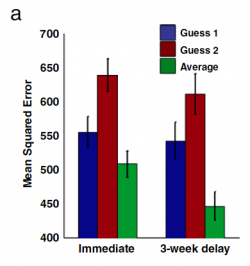Average of Two Guesses (Both by You) Is More Accurate Than the First or Second Guess Alone
Vul and Pashler’s paper on guessing, which I thought would be fun to share; perhaps you missed it initially as I did. Consider this question:
“What percentage of the world’s airports are in the USA?”
The idea is to guess at the answer. Then take a minute, drink a soda or a cup of coffee, and make another guess. The claim is that the average of the two guesses is usually more accurate the original guess. They show by an empirical study that the increase in accuracy is about 6.5 percent. Waiting weeks ups the accuracy much more—the claim is it is now about 16 percent. Here is a chart from their paper:
First, read the graph (bigger bar = more error). The second guess is worse than the first. But the average is better.
